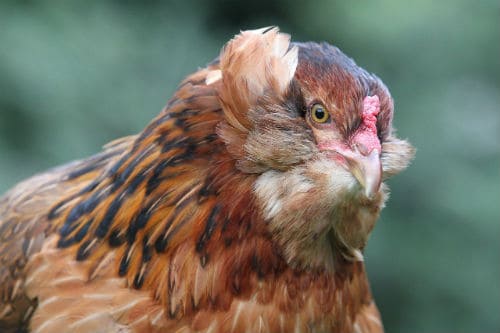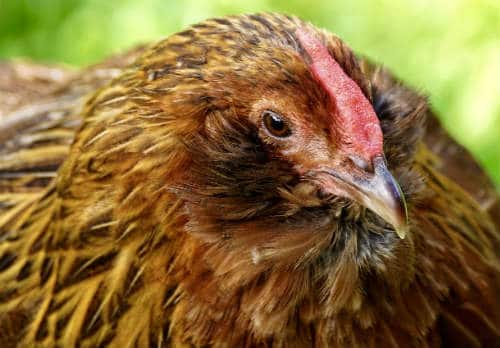Long gone are the days in which chickens were only present on the farm. Nowadays, people are buying chickens and keeping them in their own backyards. Even city-dwellers are trying their hand at owning chickens.
Considering that chickens are relatively easy to own, feed, and take care of, it’s understandable why so many people are keeping backyard chickens. Besides being affectionate and adorable, chickens also produce fresh eggs for their owners.
However, like all pets, chickens can become ill. When is it something mild, and when is it serious? First-time chicken owners may not know. This article will discuss sick chicken symptoms, what it might mean, and how you can help them.
Sick Chicken Symptoms

If your chicken is sick, it’s pretty easy to tell. Some of the most common symptoms that you might see in a sick chicken have to do with their daily habits. A healthy chicken will eat food and drink water throughout the day. Most of their day is spent foraging and looking for food.
A sick chicken won’t perform these actions. They may become lethargic or have no interest in eating or drinking. Instead of joining the others outside, they may remain in the coop. They may even end up isolating themselves from the pecking order.
There are other symptoms, too. Your chicken may have bubbly or watery eyes. Even their nose can become bubbly or watery. A healthy chicken has dry eyes and a dry nose. It’s also problematic if their eyes are swollen.
Like other animals, another useful method of checking to see if your chicken is ill is through examining their stools. Diarrhea is a key sign that your chicken might be sick. An even more concerning symptom is if the stools are bloody.
To determine if your chicken is suffering from parasites, you can examine their stools. Worms will often show up in the stools as they die and pass through the bird’s digestive system.
Their comb and wattles can also be indicative of a problem. If they’re swollen or have unusual sores on them, it could be due to a sick chicken. This is true throughout the chicken, as well. If they have sores on their bodies, then it could be due to a parasite or a disease.
Their posture and movement should also be examined to determine if they’re sick. Chickens that aren’t feeling well may not stand erect. They may be hunched like they’re cold. They may not be able to stand at all. If they do manage to stand, you might notice that they’re limping or walking as if they’re drunk.
Another thing to look out for is if your chicken is straining to pass an egg. This could mean that they’re egg bound.
You may notice bald spots on your chicken, as well. If the feathers are drooping, not well-groomed, and have bald spots, then your chicken could be ill as well.
Common Illnesses for Home Diagnosis
- Marek’s Disease: twisting their heads, problems with breathing, blindness, lesions around feather follicles, severe weight loss, hens stop laying eggs
- Mites: incessant dust baths & visible insects within feathers
- Egg binding: egg stuck near your chicken’s exit or vent
- Avian influenza: diarrhea, nasal discharge, misshaped eggs
- Impacted crop: a good sign would be if your chickens refused food
- Coccidiosis: diarrhea, which may become bloody
- Heatstroke: you’ll observe your chickens trying to move feathers away from the body
- Worms: would be visible in feces
Steps to Take If Your Chicken is Sick

If you start noticing any of the symptoms discussed above, then the first step that you should take is to separate the chicken that you believe is sick. Contamination can spread quickly through birds. To keep the rest of your flock healthy, the sick bird must be quarantined.
This is also important because if you have any bullies in your flock, they will start to pick on the sick bird. Sometimes they might even just be nosy. It’s not uncommon for healthy birds to pick at the sores on a sick chicken. This can further aggravate their injuries and cause the sick chicken’s health to decline further.
It can also contaminate the chicken that’s doing the curious pecking. For the health and safety of the sick chicken, quarantine it as soon as you believe it’s sick.
How to Quarantine Your Chicken

For first-time chicken owners, it isn’t enough just to keep your chicken out of the coop with the other chickens. They need to be separated completely. More than that, they need to be housed in a different building entirely.
You can do so by easily installing a wire dog crate several feet away from the main hub for the chickens. Your sick chicken will be kept away from the healthy ones but still be able to see them. It’s important that they’re still able to see each other.
Otherwise, when the sick chicken gets better and returns to the group, it won’t be ostracized.
The sick chicken should also have its own feed and water. The items that you use to feed and water them should only be used for that area. For example, you should not carry a water bucket that is used for both the healthy chickens and the sick chicken back and forth. This can spread the disease.
It’s also important that the sick chicken has its own feed. If the problem is parasites, then you’ll find that your other chickens will become ill, too. By providing different feed for the sick chicken, it can further narrow down the possible illnesses or problems that are affecting your sick chicken.
By providing your sick chicken with its own feed, you’re also helping limit the chance of spreading the disease to your healthy chickens.
In the event that the disease is dangerous or extremely catching, it’s a good idea to have a bucket or bowl of bleach outside of the pen. You can step into it every time you leave the sick chicken’s coop to kill off the pathogen. You can also wear boot covers to help keep the pathogen from being carried by your clothes.
It’s also important that you wash your hands after handling the sick bird. You don’t want to be the carrier for the disease and be the reason for more of your chickens becoming ill.
Catching your chicken is an event in itself. Even if sick, the chicken might try to run from you. The last thing you want is to wear yourself out chasing down a chicken. Especially because you’re also wearing down the chicken, which can have a negative impact on their health, too.
Instead, you should work to train your chickens to come to you when you’re feeding them grain. That way you can easily scoop up the chicken. It will be used to being handled by you.
Another idea is to have others help you corner the chicken, so you can use a catch net to ensnare it and bring it safely to you.
If your chickens can fly, then be aware that they may attempt to fly over the fence. In an area that is enclosed, the chicken might injure itself by running into the flight cage. Be ready to perform first aid on it in the event that it hurts itself.
Treatment

In most cases, all your chicken needs to become healthy again is a bit of nursing. Fresh food, plenty of water, and perhaps a few medications should be enough to get rid of the disease or parasites that are plaguing them.
If your chicken has any injuries, then you’ll also need to disinfect them regularly to keep them from becoming infected. If those wounds become infected, then your chicken will remain ill longer.
Due to some of the symptoms above sounding like a cold, it’s common for first-time chicken owners to believe that their chickens have a cold. Chickens cannot get the cold. Any respiratory issue that they have is due to an infection.
Because of this, you shouldn’t feed antibiotics to your chicken to deal with respiratory problems. Antibiotics will help with the systems, but they won’t get rid of the disease. What’s even worse is that you’ll make your sick chicken a carrier of the disease.
Instead, you should check with your local vet about medications for your chicken.





helpful article, thanks … liked the home diagnosis section